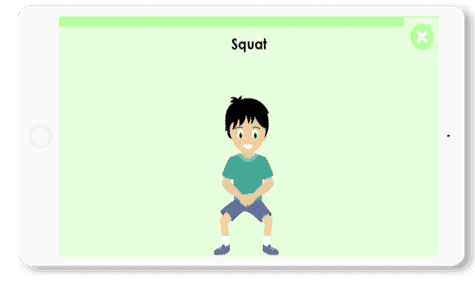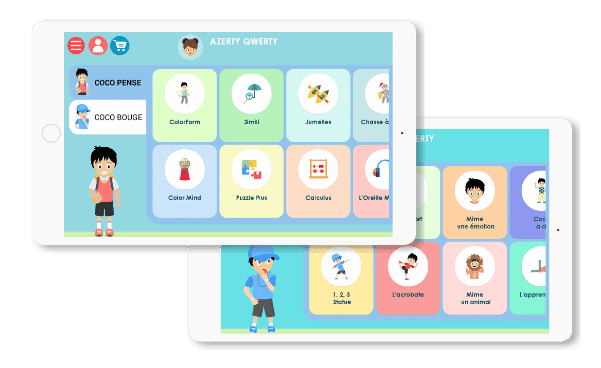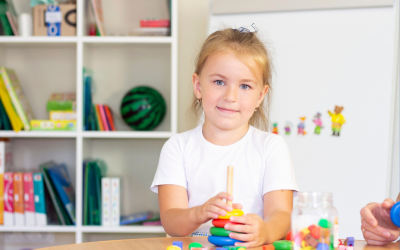In today’s society, children are exposed to more and more screens, whether at school or at home. However, one question that arises is whether this prolonged exposure to screens can have a negative impact on children’s concentration.
Some parents and educators are concerned about the impact of screens on their children’s ability to focus, process information and retain attention. In this context, it is important to look at the available research and studies to assess whether screens are harmful to children’s concentration.
How can screen time affect children’s concentration?
Screen time, the time children spend in front of TV, tablet or cell phone screens, can have a negative impact on their concentration. Screens have a stimulating effect on children’s brains, which can make them more excitable and less able to focus on tasks that require sustained attention.
Video games
For example, imagine a child spending hours playing video games on a tablet. Video games are often designed to be very stimulating, with bright colors, loud sounds and visual effects that grab a child’s attention. When children spend too much time playing these games, they may have trouble concentrating on activities that are less challenging, such as reading a book or writing a paper.

Quality of sleep
In addition, screen time can also affect the quality of a child’s sleep, which in turn can affect their ability to concentrate. Screens emit blue light that can disrupt a child’s sleep cycles, especially if they are exposed to screen light just before bedtime. If a child doesn’t get enough sleep, he or she may have trouble concentrating the next day, which can affect academic success.
Communication
It can affect the child’s ability to interact with others in a positive way. Children who spend too much time in front of screens may have trouble focusing on face-to-face conversations, understanding facial expressions, or understanding nonverbal cues. This can have a negative impact on their ability to communicate effectively with others, which can affect their social success and emotional well-being.
It’s important for parents to limit their children’s screen time and make sure they have enough time for other important activities, such as reading, outdoor play and face-to-face social interactions. By doing this, parents can help preserve their children’s ability to focus and succeed in life.
How can the school year go if a child is addicted to screens?
If a child is addicted to screens, it can have serious consequences on his school year. Children can become addicted to screens because of the instant gratification they provide, their entertaining nature and their constant accessibility. This can lead to addiction, which can have negative effects on the child’s physical, mental and emotional health.
Lack of concentration
The child may have difficulty concentrating in class. The constant distractions of notifications, messages and games on screens can make it difficult for a child to focus on lessons and assigned tasks. He or she may miss important information and have difficulty keeping up with the pace of classes.
In addition, the child may have difficulty with homework. Homework requires prolonged concentration and attention to detail, and excessive use of screens can make this difficult for the child. He may be distracted by device notifications or spend time on games and social media rather than focusing on homework. This can lead to poor grades and decreased academic performance.
Mental health and sleep
Excessive screen use can affect a child’s sleep quality. Exposure to blue light from screens can disrupt a child’s circadian rhythm and disrupt their sleep schedule. This can lead to sleep problems, such as insomnia and daytime sleepiness, which can affect the child’s ability to concentrate in class.
Finally, excessive screen use can have an impact on a child’s mental health. Studies have shown that excessive screen use can increase the risk of depression and anxiety in children and adolescents. This can affect the child’s ability to concentrate in class due to distraction from negative thoughts and intense emotions.
In short, excessive screen use can have a significant impact on a child’s school year. Difficulty concentrating, sleep problems, homework difficulties and mental health issues can all affect a child’s academic performance. It is important for parents and teachers to set healthy boundaries and practices to help the child detach from screens and focus on schoolwork. This can include limiting screen time, establishing a regular sleep schedule and encouraging physical and social activities that promote mental health and focus.
What are some tips for parents on how to help their children improve their concentration away from screens?
It is common to see children today having difficulty concentrating, and this may be due in part to excessive screen use. Parents can help their children improve their concentration away from screens by adopting certain practices. Here are some tips for parents:
Regular breaks
First, parents can encourage their children to take regular breaks throughout the day. Children often have a lot of energy and it can be difficult for them to stay focused for long periods of time. Breaks can help reduce their stress, boost their creativity and improve their focus when they return to their tasks. Parents can also help their children develop routines that include time for relaxation, meditation or exercise.
Activities
Second, parents can encourage their children to engage in activities that stimulate their minds. Activities such as reading, art making, puzzles, board games and outdoor activities can help children develop concentration, creativity and problem solving skills. Parents can also encourage their children to set goals to achieve specific outcomes, which can help them stay motivated and focused.
Diet and sleep
Third, parents can help their children improve their diet and sleep. Healthy eating habits and enough sleep can help boost children’s focus and attention. Parents can encourage their children to eat nutrient-rich foods, such as vegetables, fruits, proteins and healthy fats, and to avoid processed foods and sugary drinks. In addition, parents can establish regular sleep routines to help their children get enough rest.
Curiosity
Finally, parents can encourage their children to develop their curiosity and interest in the world around them. Children who are curious tend to be more motivated and focused because they are interested in what they are learning. Parents can encourage their children to ask questions, explore their environment, learn new things and discover their passions. In addition, parents can be role models for their children by being curious and interested in the world themselves.
In summary, parents can help their children improve their concentration off-screen by encouraging regular breaks, stimulating activities, healthy eating and sufficient sleep, and by developing their curiosity. It is important to remember that every child is different and that parents need to find practices that are appropriate for their child’s age, personality and interests.
How can we help children understand the importance of balancing screens with other activities?
It is important to help children understand the importance of balancing screens and other activities from an early age. Children who understand the importance of having a variety of activities in their lives are more likely to develop healthy screen use habits. One way to help children understand this is to give them choices and encourage them to find a balance that works for them.
For example, rather than just telling them to limit their screen time, parents can talk with their children about the different activities they like to do, such as playing outside, reading books, drawing or spending time with friends. Then they can help children plan their day or week to include a little bit of everything, including limited screen time. Parents can also encourage children to think about how they feel after screen time compared to other activities, and to understand that a variety of activities can help maintain good mental and physical health.
Finally, parents can set an example by showing children how they balance their own time between screens and other activities. Children are often more willing to follow their parents’ lead, and if parents demonstrate the importance of healthy balance, children are more likely to follow.
THE EDUCATIONAL AND SPORTS APP THAT PROTECTS AGAINST SCREEN ADDICTION
The COCO THINKS and COCO MOVES application imposes a sports break every 15 minutes of screen time. This allows them to exercise, and then to be more focused!
Note that it is also possible to use the app only with sports activities, to adapt the games to your child. Personalize his experience and teach him to focus.
COCO MOVES’ PHYSICAL GAMES



Discover the COCO THINKS and COCO MOVES app
The COCO THINKS and COCO MOVES app contains more than 30 educational games to work on English, math, logic, memory or attention.
In addition, the application imposes a sports break every 15 minutes of screen time to teach a measured use of screens.
Much smarter than a parental control!

Other articles that might interest you:
Supporting children with autism
Dynseo proposesSUPPORTING CHILDREN WITH AUTISM with COCO THINKS AND COCO MOVESDynseo and its team are very much...
Supporting DYS children with COCO THINKS and COCO MOVES
Dynseo proposesDYS disorders with COCO THINKS and COCO MOVESOur educational and pedagogical games program COCO THINKS...
Language development
Children communicate from birth with movements, crying, looking at each other or with smiles. After only a few months,...
Supporting children with Down Syndrome with Coco
Dynseo proposesDOWN SYNDROME with COCODown syndrome is a non-hereditary chromosomal abnormality that leads to the...
Supporting people after a stroke
Dynseo proposesStroke with CLINT, your brain training coachThe Dynseo team is very involved in helping people who have...
Supporting someone with Alzheimer’s
In this guide, we will detail how SCARLETT can be used for supporting someone with Alzheimer's. SCARLETT is a...
10 myths about the human brain you didn’t know
The brain is an incredible muscle, however there are many things we do not know, and what we do know is not always...
Using Digital Tools to Support Students with Special Educational Needs
Special Educational Needs (SEN) encompass a wide range of learning difficulties and disabilities that can hinder a...
Down Syndrome and Communication: Facilitating Interaction with Visual and Interactive Supports
When we think about Down syndrome, we often recognize it as a genetic condition that affects physical and cognitive...
How to Track Progress in People with Down Syndrome Using Digital Tools
Down syndrome, a genetic condition caused by the presence of an extra chromosome 21, affects approximately 1 in every...












